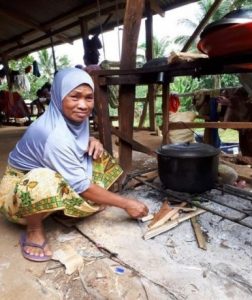A story from Marawi
With two minor sons, two granddaughters and a sickly husband, it has been difficult for 61-year-old Babo Aisa to cope with their daily needs in their temporary shelter in Barangay Pansor, Pantao Ragat, Lanao del Norte. The family has been displaced since May 23rd, 2017 from Lilod Bliss, Marawi City. “We thought the conflict would last only for few days. 1970’s was the last time I’ve been displaced but both displacements have been destructive. It was May 23rd around 2pm and I was preparing for the Kanduri festivities for Ramadhan when my 13 year old son suddenly shouted that we needed to flee in rush because a conflict broke out. I grabbed only few belongings and I hurriedly fled towards the forest areas around Marawi City with my 2 year old granddaughter”, Babo Aisa recalled. The family arrived in Pantao Ragat after almost 24 hours of walking together with other displaced people. Based on the updates communicated by the Department of Social Welfare and Development (DSWD) at the beginning of September some 360,000 persons had been displaced by the conflict in Marawi City.
ACTED organised cash transfer programmes to support those displaced, which have been vital for family survival. What came out of consultations with the displaced communities was that they would like to receive assistance in the form of cash so they can purchase necessary items and services for their families.They believe such assistance will empower them to decide what assistance is needed and prioritise the individual needs of their family.
I am very thankful. I am now able to buy food, medicine for my husband and toys for my two granddaughters. I feel relieved to have the medicines for my husband, without cash from ACTED I don’t know where to get money for the medicines.
Her husband is suffering from diabetes and a skin allergy he acquired during his stay in an evacuation centre.
Babo Aisa’s sons are 16 and 13 years old – they quit school and since then occasionally work as labourers in farms to-find ways to cope with their situation. This work enables them to make some money, but is very unstable as it depends on the needs of farm owners. The family started planting vegetables close to the evacuation centre where they found refuge to have some food for the family. Most of the time, Babo Aisa prepares rice porridge for long runs of the food they have. Her son also actively participates in the cash-for-work programmes organized by DSWD – Babo Aisa can’t, as she needs to look after her sick husband.
The family is eager to return home and resume their lives, but it represents a big challenge as their house was destroyed. Barangay Lilod Bliss, where the family comes from, remains at the heart of the conflict and continuous aerial bombing.
